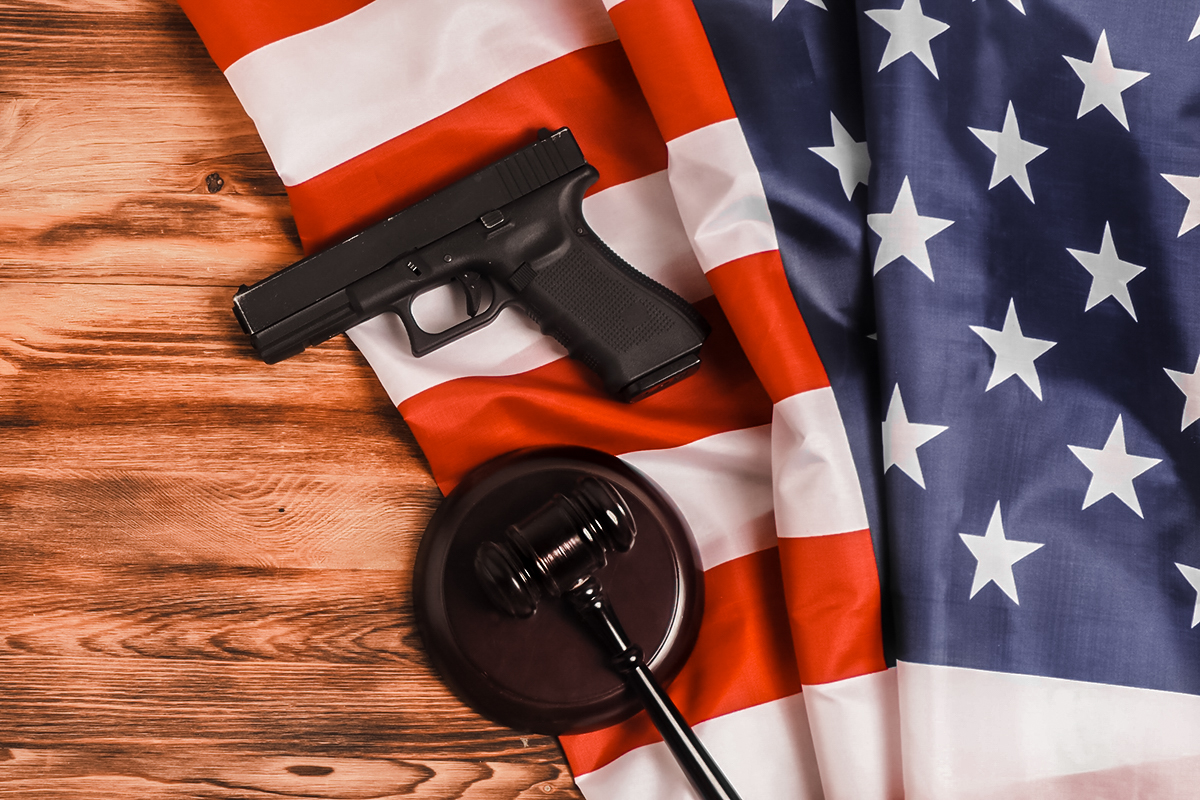This month, two federal appellate courts cited last summer’s landmark Supreme Court decision in the NYSRPA v. Bruen case when they ruled that laws prohibiting certain criminal classes from possessing firearms were unconstitutional. The ruling also gave us what has become known as the Bruen test for gun-control legislation.
In the Bruen decision, the High Court created a new framework to test the constitutionality of gun control laws by requiring them to be “consistent with the Nation’s historical tradition of firearm regulation.” In layman’s terms, according to legal scholars, that means any regulatory policy must align with laws that existed around the time the Constitution was written and expanded after the Civil War.
“If somebody is too dangerous to be in society to the point where the federal government has to disarm them, then they shouldn’t be in society.”
—C.J. Grisham
In the first case to apply the Bruen test, U.S. v. Rahimi, a Texas court recently overturned a ruling prohibiting a person with a domestic violence restraining order from possessing a firearm. And in the second case, U.S. v. Harrison, an Oklahoma court recently dismissed charges against a man arrested for possessing marijuana and a gun.
Very few gun rights groups have commented on the cases, but those that did applauded the results. Aidan Johnston, the federal affairs director for Gun Owners of America, called the results “a great thing for America.”
RELATED — $70M Earmarked for Zombie Deer Disease Research, Management
U.S. v. Rahimi

In the Rahimi case decision, the judges said the ruling wasn’t about determining if disarming a domestic abuser was a “laudable policy goal;” rather, it was about determining if the federal statute that allows it is unconstitutional. The ruling only applies to states within the Fifth Circuit, which includes Texas, Mississippi, and Louisiana. Unfortunately, the person at the center of the case isn’t exactly representative of law-abiding gun owners.
Zackey Rahimi was charged with possessing a firearm while under a domestic violence restraining order; he was also facing a number of charges at the time after an absolutely ridiculous crime spree. Between December 2020 and January 2021, Rahimi was involved in five different shootings around Arlington, Texas.

Beginning on Dec. 1, Rahimi shot at someone’s house after selling him drugs; he shot at a driver two separate times after getting into a car accident on Dec. 2; he shot at a cop car on Dec. 22; and he fired multiple shots into the air on Jan. 7 after his friend’s credit card was declined at a Whataburger.
Police identified Rahimi as the shooter and executed a search warrant of his home, where they found a rifle and a pistol, which he wasn’t supposed to have due to an agreed civil protection order issued several months earlier after he allegedly assaulted his ex-girlfriend, regardless of the new charges against him.
The Supreme Court has ruled that the statute that barred Rahimi from gun ownership, despite his crimes, was unconstitutional.
Domestic violence and gun control groups condemned the ruling, calling it “extreme and dangerous” and describing it as “devoid of the lived experiences and understanding of survivors’ reality.” They also pointed to federal data showing that most female homicide victims in the U.S. are killed by a current or former male partner.
U.S. Attorney General Merrick Garland issued a statement immediately following the ruling, saying it undermined a 30-year-old law. “Whether analyzed through the lens of Supreme Court precedent, or of the text, history, and tradition of the Second Amendment, that statute is constitutional.” He added the Justice Department will review the “contrary decision” further.
Tom Grieve, a Second Amendment attorney who called the decision a “win for gun owners,” said Garland’s comments give insight into the government’s strategy if it appeals the Rahimi decision. The goal is to “expand” the history and tradition of gun regulation to include the 1990s instead of limiting it to timelines decided by the Supreme Court.
Gun rights activist and attorney C.J. Grisham described the ruling as “good news because it gets rid of an unconstitutional gun law” in a video.
“If somebody is too dangerous to be in society to the point where the federal government has to disarm them, then they shouldn’t be in society,” Grisham said.
GOOD GEAR — Coffee-forward Flavors, Premium Ingredients, 200mg Caffeine: New Ready to Drink
The Bruen Test in U.S. v. Harrison Possession Case

In the Harrison case, Texas police officers pulled over Jared Harrison in May 2022. During the traffic stop, they noticed he was wearing an ankle monitor and discovered that he was awaiting trial for aggravated assault. When they searched his car, they found a loaded revolver and cannabis products in the vehicle. They arrested him for drug and traffic violations.
Later, in August 2022, a federal grand jury indicted Harrison for violating the Gun Control Act, specifically possessing a firearm with knowledge that he was an unlawful user of marijuana.
In the ruling earlier this month, the federal appellate court agreed to dismiss the charges. In the decision, the court called the violation “unconstitutionally vague” and said it “unconstitutionally infringes upon his fundamental right to possess a firearm.”
“The result could restore Second Amendment rights to many cannabis users who have been denied them.”
—Griffin Thorne, Canna Law Blog
Harrison’s attorney, Laura Deskin, called the Harrison decision “an excellent outcome” in an email to Free Range American, and Alan Gottlieb, the executive president of the Second Amendment Foundation, agreed.
“The SCOTUS Bruen decision has reinforced 2A rights, and this case is an example of that, and we will see many anti-gun rights laws overturned in the near future,” Gottlieb said.
Griffen Thorne, a cannabis attorney who writes the Canna Law Blog, explained that up to this point, the federal government has viewed all marijuana users as prohibited persons despite legal changes at the state level. And while others have filed similar challenges before, the Harrison case relied on the Bruen test.
Although changes won’t be immediate, Thorne said that he presumes that other courts will issue similar rulings in the future months and years. “The result could restore Second Amendment rights to many cannabis users who have been denied them,” he wrote in a recent post.
RELATED — The Valentine’s Day Massacre Tommy Guns and Birth of the NFA
Up Next: Range v. U.S. Gun Rights Restoration Case

On Feb. 15, the Third Circuit Court of Appeals will rehear the case of Range v. U.S., in which a non-violent felon will try to restore his gun rights. The case involved Bryan Range, who defrauded the state of Pennsylvania for almost $2,500 in food stamps and was convicted of a third-degree felony.
When the appellate court originally heard the case in September 2022, judges denied the request, saying the decision to strip away the right was consistent with the “history and tradition of firearm regulation.” However, the court heard the case about two months after the Bruen decision came out, so it vacated the decision and agreed to rehear the case in light of the new framework.
Mark Smith, a law professor and host of The Four Box Diner, explained that if the court overturns the decision, it will effectively strike down the federal statute prohibiting non-violent felons from possessing firearms. And if that happens, the Biden administration will likely appeal the ruling, sending the case to the Supreme Court.
Smith argued that if the court were to follow historical precedent, it would apply a “dangerousness” standard as opposed to a “virtuous” standard before deciding to strip away a felon’s gun rights. The difference between the two is that a dangerous felon poses a threat of violence to the public.
READ NEXT — The Boss Bear: Meet the Most Badass Bear in Banff










Comments